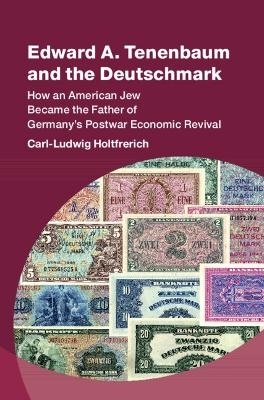
Edward A. Tenenbaum and the Deutschmark
Cambridge University Press (Verlag)
978-1-009-49281-2 (ISBN)
German industry had survived Allied bombing largely unscathed. Currency reform was necessary to provide incentives for capital owners and labor to produce. The abundance of old Reichsmarks had to be curtailed to a scarce supply of Deutschmarks that users would expect to retain value. It was Edward A. Tenenbaum, currency expert of US military government in Berlin since 1946, who managed the exceptionally successful currency reform in West Germany 1948, which was implemented by the legislative powers of the three Western Allies against opposition from West German financial experts. It was the foundation of West Germany's 'economic miracle.' The West German currency conversion is part of the founding myth of the Federal Republic of Germany. Yet Tenenbaum's pivotal role is largely unknown among the German public. Besides providing a full-blown biography of the true father of the currency reform, this book elevates Tenenbaum to his proper place in German history.
Carl-Ludwig Holtfrerich is Professor of Economics and Economic History at John F. Kennedy Institute for North American Studies of the Freie Universität Berlin. He is the author of The Great German Inflation 1914 to 1923 (1986) and has published extensively on business and banking history as well as domestic and foreign economic-policy issues. He is the recipient of The Financial Times/Booz-Allen & Hamilton Global Business Book Award and the Helmut Schmidt Prize in German-American Economic History at the German Historical Institute in Washington DC.
1. Introduction; 2. Ludwig Erhard, who took credit for Edward A. Tenenbaum's success; 3. Edward A. Tenenbaum's family roots, adolescence, and military experience until 1946; 4. In action for OMGUS and currency reform in Germany 1946–1948; 5. From OMGUS to civil service in Washington DC and for Europe 1948–1953; 6. Life and fate as a business and family man 1953–1975 and beyond; 7. Conclusion.
| Erscheinungsdatum | 22.10.2024 |
|---|---|
| Reihe/Serie | Studies in New Economic Thinking |
| Zusatzinfo | Worked examples or Exercises |
| Verlagsort | Cambridge |
| Sprache | englisch |
| Maße | 161 x 235 mm |
| Gewicht | 1330 g |
| Themenwelt | Geschichte ► Teilgebiete der Geschichte ► Wirtschaftsgeschichte |
| Wirtschaft ► Volkswirtschaftslehre ► Makroökonomie | |
| ISBN-10 | 1-009-49281-0 / 1009492810 |
| ISBN-13 | 978-1-009-49281-2 / 9781009492812 |
| Zustand | Neuware |
| Haben Sie eine Frage zum Produkt? |
aus dem Bereich


